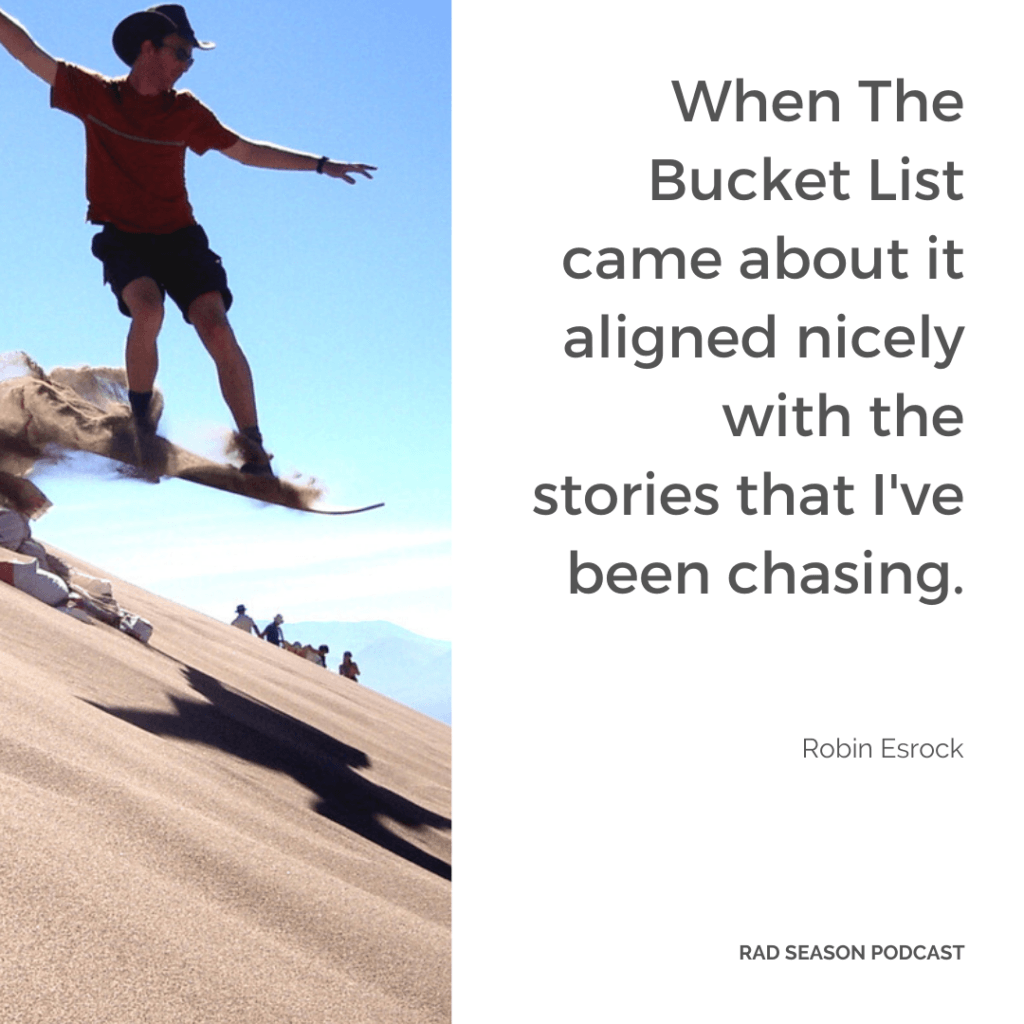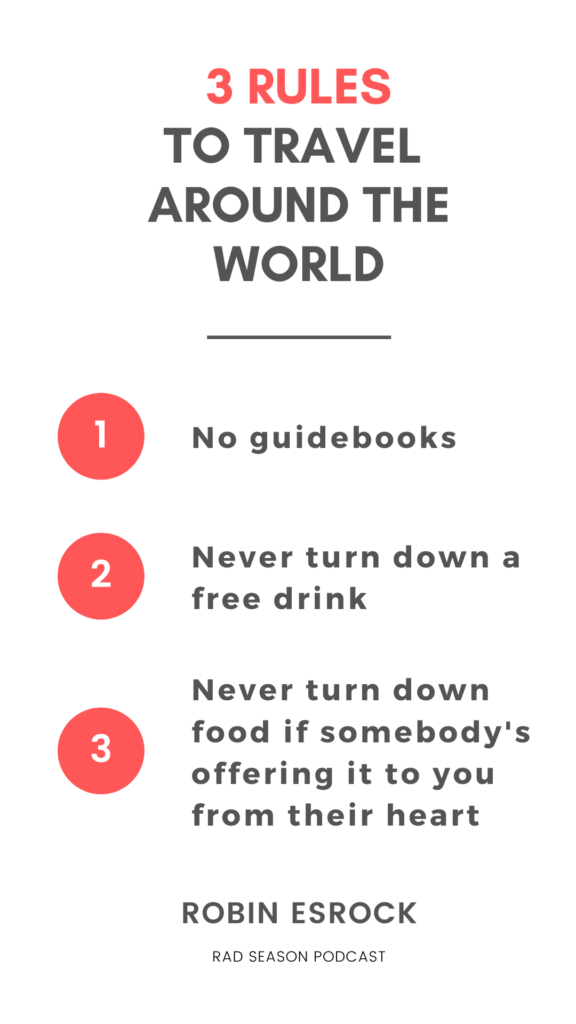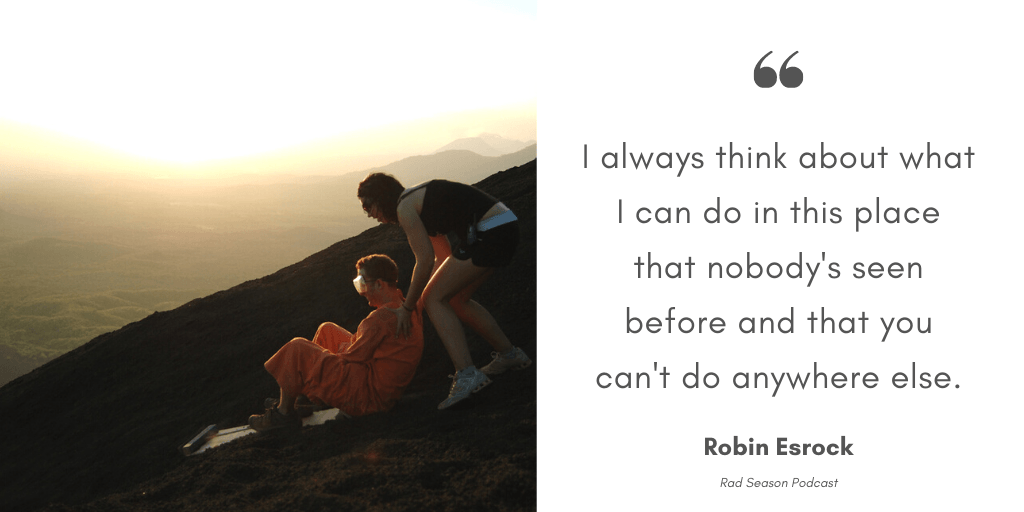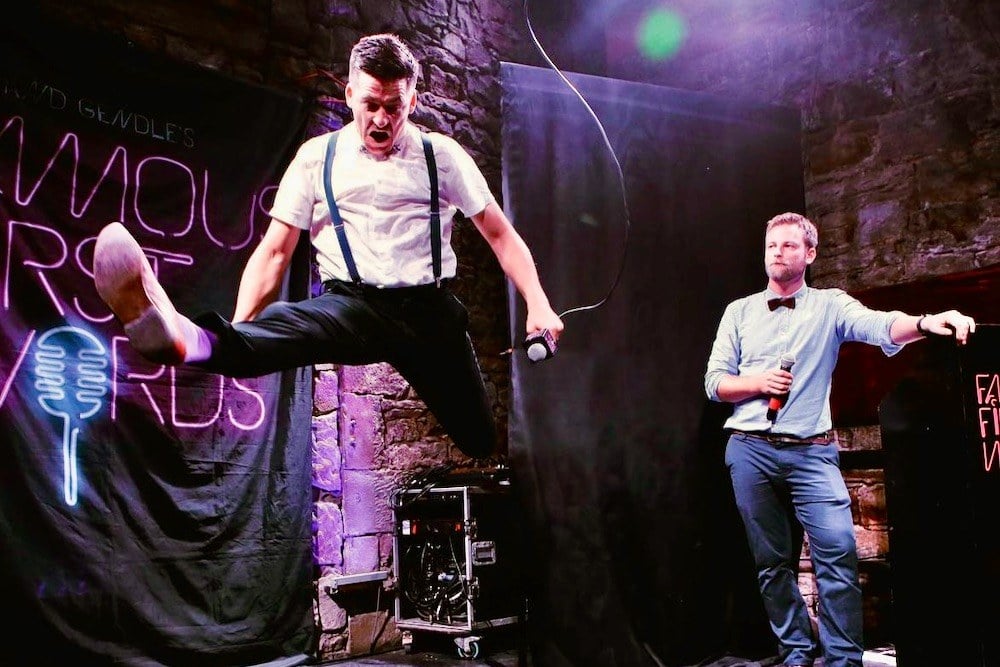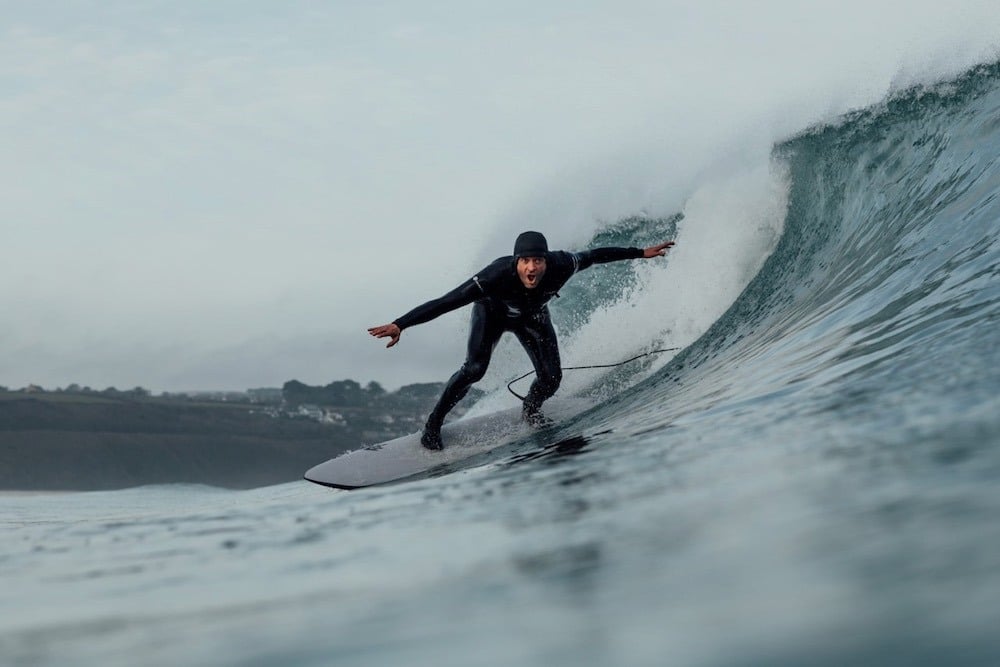Bucket List: Robin Esrock
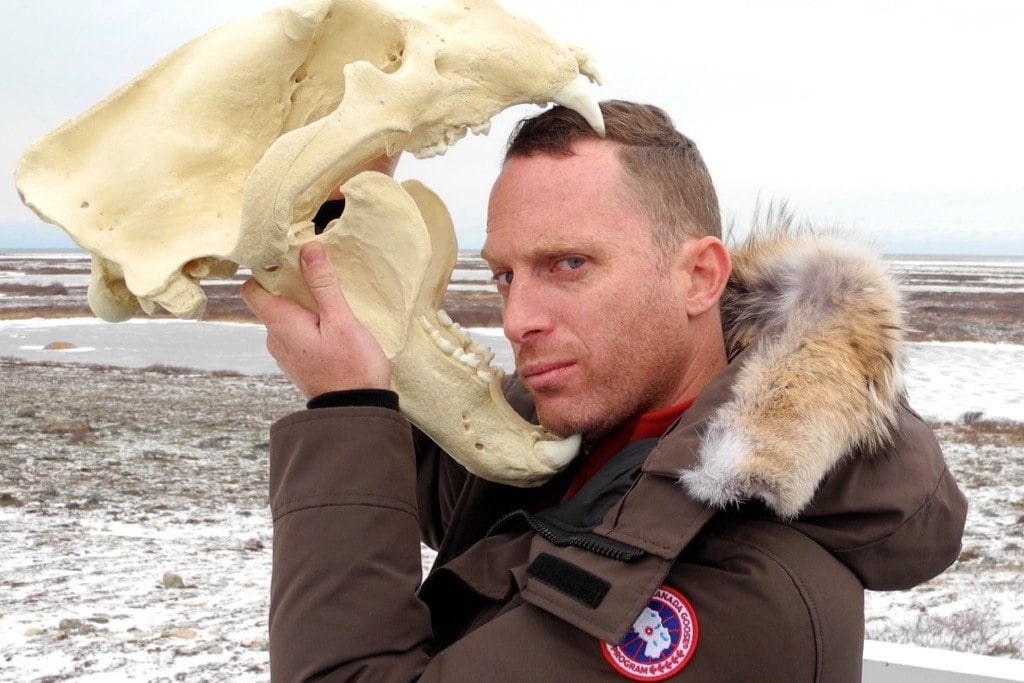

Episode 12: Podcast with Robin Esrock, the King of the Bucket List and global adventurer, travel writer, bestselling author and speaker
In this episode, Oli Russell-Cowan chats to Robin Esrock who traveled to 100 countries across 7 continents.
After a motorbike accident back home Robin decided to quit his job and travel with some insurance money from the accident. What started off as a one year journey of living dangerously turned into a new career of travel journalism. His stories have since been published in many publications like National Geographic Traveler, The Guardian and Chicago Tribune and he has been featured on tv including CNN, Huffington Post, MSNBC, ABC and 60 Minutes.
Robin developed and co-hosted the TV series ‘Word Travels’, revealing the real story of professional travel journalism and created the adventure-culinary show ‘Get Stuffed’. He spoke at TEDx about the lessons of travel and started to write books.
The books ‘The Great Canadian Bucket List: One-of-a-Kind Travel Experiences’, The Great Global Bucket List, The Great Australian Bucket List and 75 Must See Places to Take the Kids (before they don’t want to go) became national bestsellers.
In their conversation, Robin dives deep on how he started traveling, how the term bucket list came about and what it means to him.
The main takeaway of the chat was that traveling is a great experience when you say, it was out of this world, it was like going to another planet.
When you go traveling drop the entitlement, drop the expectations. What will be, will be. It will be your experience, don’t try and chase my experience or anybody else’s.
Listen to the podcast:
Dive in and listen to this episode on Apple Podcast and Spotify.
Rad Season: Hi guys, it’s Oli from Rad Season. I’m excited to be joined today by international best selling travel writer and author Robin Esrock.
Robin, Thanks for joining us.
Robin Esrock: Great to be here.
Oli: Whereabouts are you at the moment?
Robin: I’m in my office in Vancouver, Canada, and like most people haven’t been out for what feels like forever.
Lockdown in British Columbia, Canada
Oli: How’s the situation over there? When did lockdown begin and what’s been happening?
Robin: We’ve been very fortunate here in British Columbia. Out of all the regions with more than 5 million people in North America, Western Europe, we’re at the bottom in terms of infections and fatalities. So we’ve been very, very fortunate. We are only at about 10 infections a day.
We’re in stage three of lockdown. So that basically means everything’s open and everything’s opening up. Even at the height of lockdown, we weren’t as bad as other places. The province did really well. The leadership did really well, people have been following the rules. So we’re very fortunate.
We’re very outdoorsy, right? So that really made a huge difference. We don’t have a big public transport system and we’re outdoors and it’s spring so it’s all played in our favor. All the places to be in the world right now, Vancouver’s definitely one of the places you don’t mind being in.
Travel Writing and Travel Media
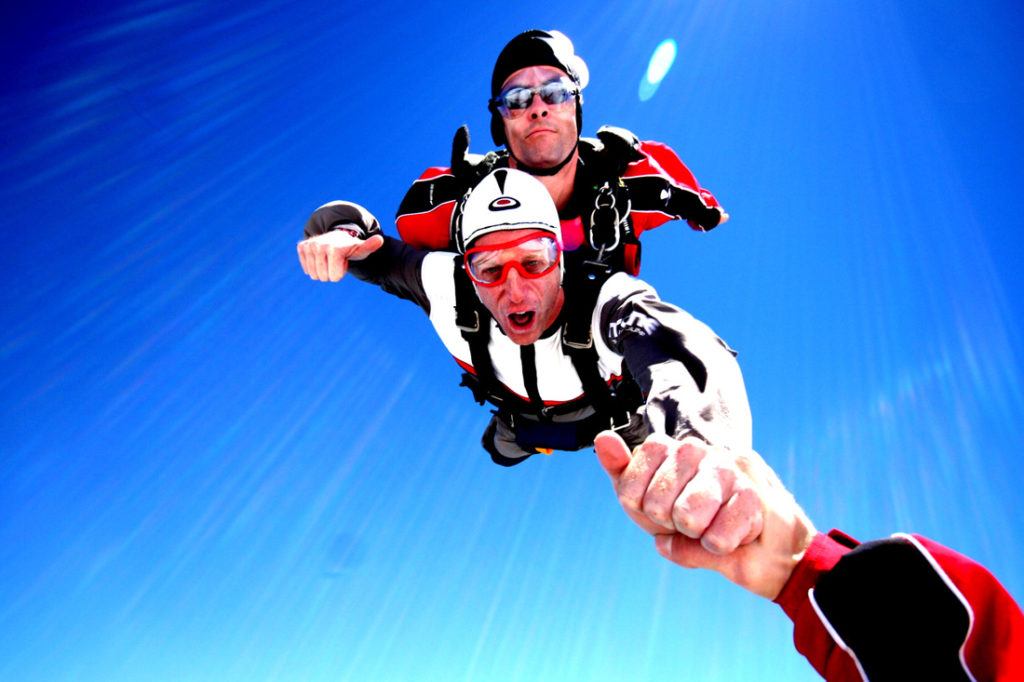
Oli: I’d love to go back to where traveling began for you and when you thought okay, travel could be a career.
My story is that I was hit by a car on my way to work one morning in a desk job that I wasn’t very inspired by. I received a $20,000 insurance settlement for a broken kneecap, which I called the luckiest break of my life. I took the money and I went backpacking for a year.
There was a moment where the lights went on. I didn’t quite understand what travel media was or what travel writing was about. It was my idea to capture as much of the fear as I could in what we call a blog. Now though, in 2005, blogs weren’t a big thing, they were just starting to come up. But I could build websites, so I decided to capture as much as I could. There was a huge amount of discipline that was involved in that. Sitting down one day a week writing thousands of words. Doing my favorite photos of the week, interviewing every person I met. It was all for me, it wasn’t to create some sort of profile, it wasn’t to build a brand.
Just before I left, I pitched a newspaper the idea for a column. It was the first time I’ve ever got something like that, and they loved the idea. So I became a columnist for The Vancouver Sun, the main newspaper here in Vancouver.
Hang Gliding in Rio de Janeiro, Brazil
There was a moment in Brazil, where the light went on and that was in Rio de Janeiro. It was a part of the beach where hang gliders go off Pedro Lopez, I think it’s called. It’s a mountain that goes over the beach and hang gliders love it!
They come from all over the world to go hang gliding over the beach. You can go hang gliding with these guys, you know, they are tandem pilot instructors, they put you in a cocoon next to them and then you run off and they do everything and you land on the beach.
I thought wow, bucket list, right? But I couldn’t afford it. My budget was $35 a day for 12 months. So that included food and accommodation and activities.
I started speaking to one of the guys and he said $200. I know when people are traveling, there’s always this temptation of when am I going to get the chance to do this again, but when you’re traveling for a year, and I think that was the third month. If I said, I’m just going to spend the money, I would be home in four months.
So I got talking to the guy chatting over a coconut. I told him that I write a column for a newspaper back in Canada. And he said, Well, if you write about this, I’ll take you up. If you take me up, of course, I’m gonna write about this. This is the most exciting thing of the week by miles and that’s when the light went on.
In terms of how I could use travel writing as a tool to tick off everything I’ve ever wanted to do, in a kind of tit for tat, everybody wins scenario because I’m super enthusiastic and I want to write about it. I want to inspire people to do it. I can’t afford to do it myself. But these guys will invite me to come along and using that kind of model is how I managed to move forward.
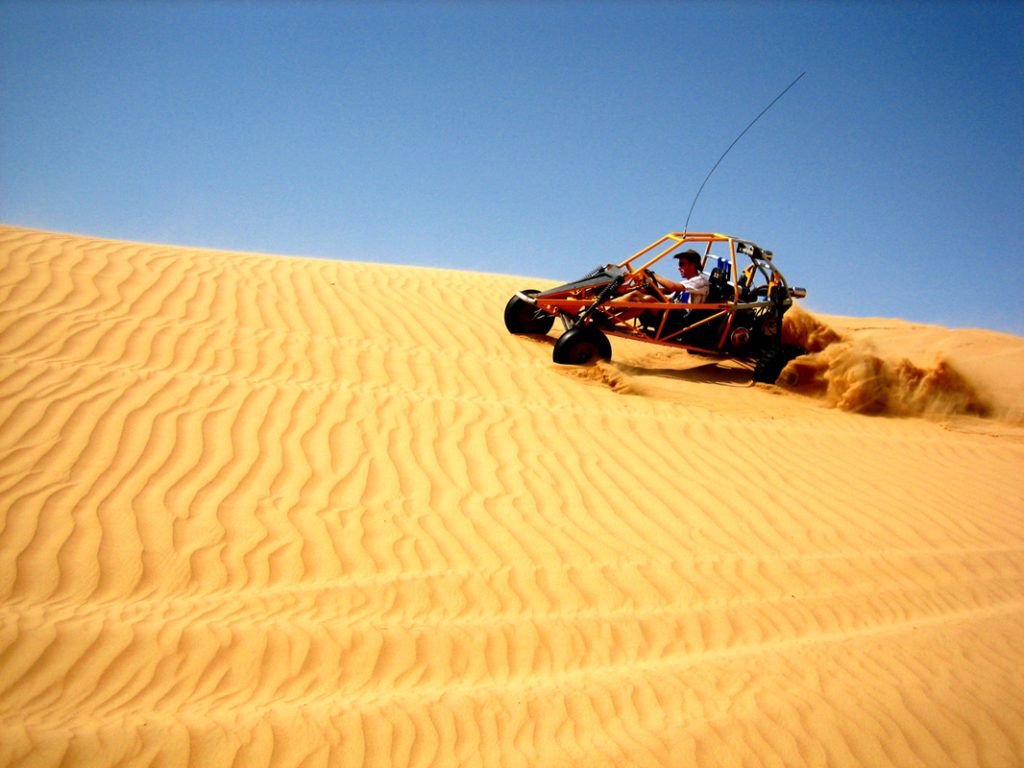
The start of the Bucket List
Oli: Was the goal then to do these experiences and bucket list things you were traveling to different places?
Robin: Yeah, so everywhere I went I would look to try to do the one thing that you should do there.
Bucket list as a phenomenon hadn’t really emerged yet. That only came around in 2007 with the movie, and that’s the strange thing about bucket lists. Everybody thinks they’ve been around forever.
But in 2007, the movie (Bucket List) came out with Jack Nicholson and Morgan Freeman. It introduces this corny catchphrase, to a very powerful idea that everybody resonates with that you want to see and experience certain things before you die.
I never really applied that prism in the beginning because I didn’t even know it existed. It just so happened that it dovetails perfectly with what I was doing, which was effectively chasing my bucket list.
You know, going to all the places and doing all the things I’ve always wanted to do, whether it was skydiving or seeing the Taj Mahal. I wanted to have these unique experiences.
“Then when The Bucket List came about it really aligned nicely with the kind of stories that I’ve been chasing.”
Oli: Did you do any research when you were looking to travel to these places? How did you find the experiences and things when you got there?
Robin: When I was backpacking, I did no research. That year around the world, it was all word of mouth. I didn’t travel with any guidebooks.
I had three basic rules for that trip around the world:
Travel TV Show
That was just kind of all by accident. Where it really picked up was with my TV show, ‘Word Travels’. That was a lottery ticket of being sat down by a producer and told to just choose where you want to go and what you want to do. That was in 2007, 2008 and 2009.
We started looking around the world going, where is there something unique to do? Even then I wasn’t thinking about a bucket list. But I was thinking, what I can do in this place that nobody’s seen before and you can’t do anywhere else.
That’s really how I’ve come to define what a bucket list experience is.
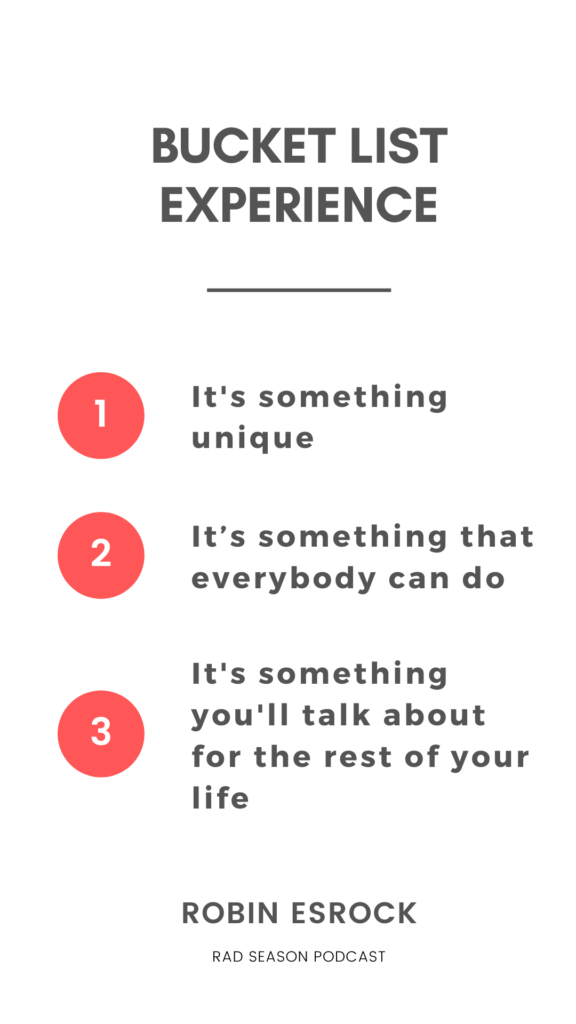
So if you’ve got these four very subjective boxes, to me, you’ve got yourself a bucket list experience. So as we traveled around the world for Word Travels, you know, everywhere we went Bolivia, okay, biking down the world’s most dangerous road. Yeah, absolutely ticked off all those boxes.
What did I do in Latvia? I can’ even remember what I did in Latvia. In Slovenia riding this Lipizzaner horse. I don’t ride horses, but these incredible horses only come from this part of the world. Everything was just really about focusing on that experience.
Favorite Countries to Visit
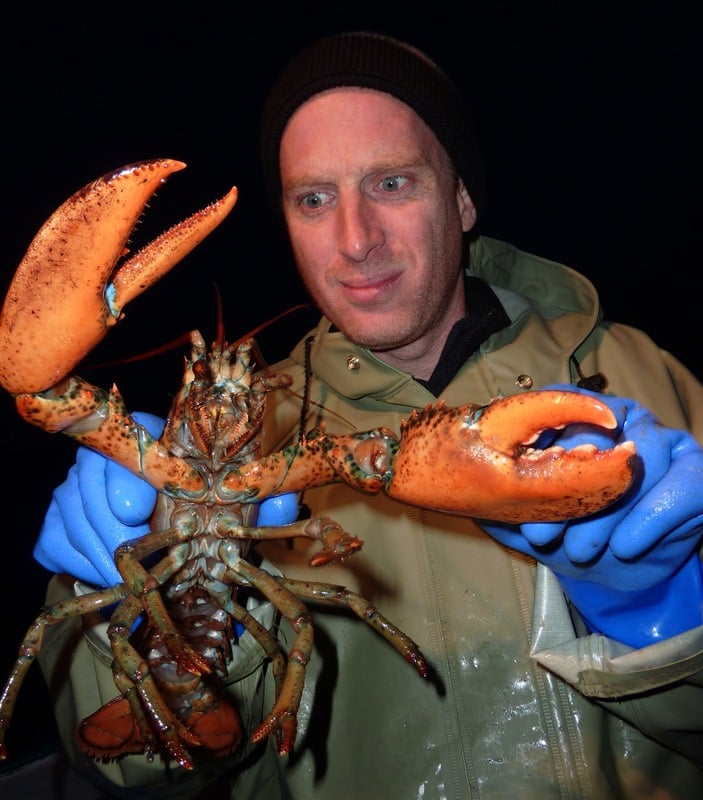
Oli: You’ve been to over 100 countries and done all these different trips throughout the years. Is there one standout experience, one bucket list thing that has been the craziest thing you’ve ever done or it just depends on which country you’re in?
Robin: Yeah, I think everyone will ask me about my favorite countries. I always say it depends on what you’re into. There are favorite countries for food, favorite countries for nature for views. Say, for views, I’ll say Iceland. For food, I’ll say Malaysia, Thailand. Animals, Africa, Kenya, things like that. I think it all depends on your interest.
If there’s one place in the world, it’s probably, I don’t know, four or five countries I can recommend easily. If you go, you will have the most incredible time. Antarctica is out of this world and is something that I think just defies imagination and the adventure itself of getting there the whole experience of Antarctica is, to me, probably my number one just in terms of, it’s like nothing else I’d seen.
I think places like Turkey and South Africa are very unique countries, with a lot of culture and landscape and history. There’s just a lot to see and do in those countries that you can’t do anywhere else.
Bolivia is a country I often recommend to people. It’s off the radar but if you go to Lake Titicaca or Salar de Uyuni you’ll see and do things there that you just can’t do anywhere else.
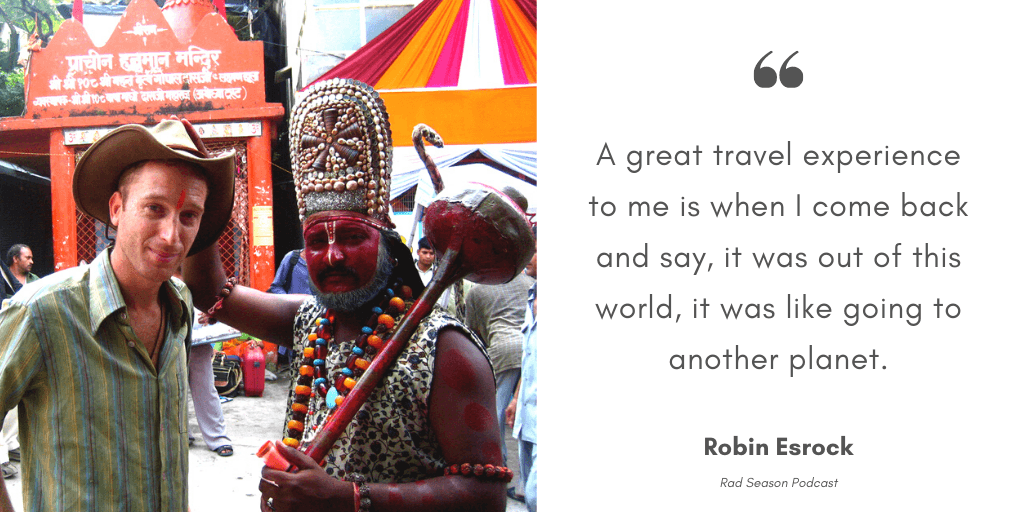
If it’s something that you feel you’ve seen and done before, then it tends to slip away in your memories. But the same with hotels, you know. If you can stay in a Tree House Hotel or an Ice Hotel, or castle hotel, these are places you don’t forget, because they’re just so unusual and so unique. And I think that’s what everybody should be or is chasing.
The Great Canadian Bucket List
Oli: Once you did the TV show where did you go from there? Was that when you looked into doing your first book?
Robin: The Great Canadian Bucket List actually came about from a column in a newspaper, here in Canada. So the TV show was about me being a travel writer myself and my co-host looking for stories. So as I was researching the stories, when we kind of wrapped I had a column in a national newspaper, where the stories would go.
On Canada Day, sort of like Australia Day, I was asked by the editor to put some sort of Canadian story together and all my travels were international. So I came up with this idea, and I called it The Great Canadian Bucket List.
Looking back, I don’t know why I called it the bucket list. Bucket list was starting to enter popular culture. I’ve traveled all over the world and I’ve never traveled Canada where I live. So I came up with an idea of all these places or these experiences that I’d really love to do. A publisher approached me about a week after the column ran and said, Would you like to write a guidebook?
And I said, there’s no way I’m going to write a guidebook. This is 2013. You know, no. Where to eat, where to sleep, where to get a pizza, it’s not my jam at all. But I’ve counter proposed the idea of actually going and doing these things and writing them first person as a travel writer, figuring someone must have done that before, though, and nobody had.
So I spent three years traveling across Canada ticking off these unique experiences, writing about that, and that book was a smash success. It really came about at a time when Canadians who tend to look to Australia, the US and Europe for inspiration and had just started to rediscover their own country.
I think now you know, with COVID even more so. People are looking around going, what can I do around here? We’ve got a fantastic wine region here in British Columbia. Why would you go to Tuscany when you can ride through the Okanagan in British Columbia.
So these kind of things are really starting to bubble up. That book has been around since 2013 and it’s a 20 times national bestseller, it did really well. And that led them to the global bucket list, which is about my international experiences, and then to The Great Australian Bucket List, in which I had the opportunity to do everything you could do in Australia.
Global Bucket List
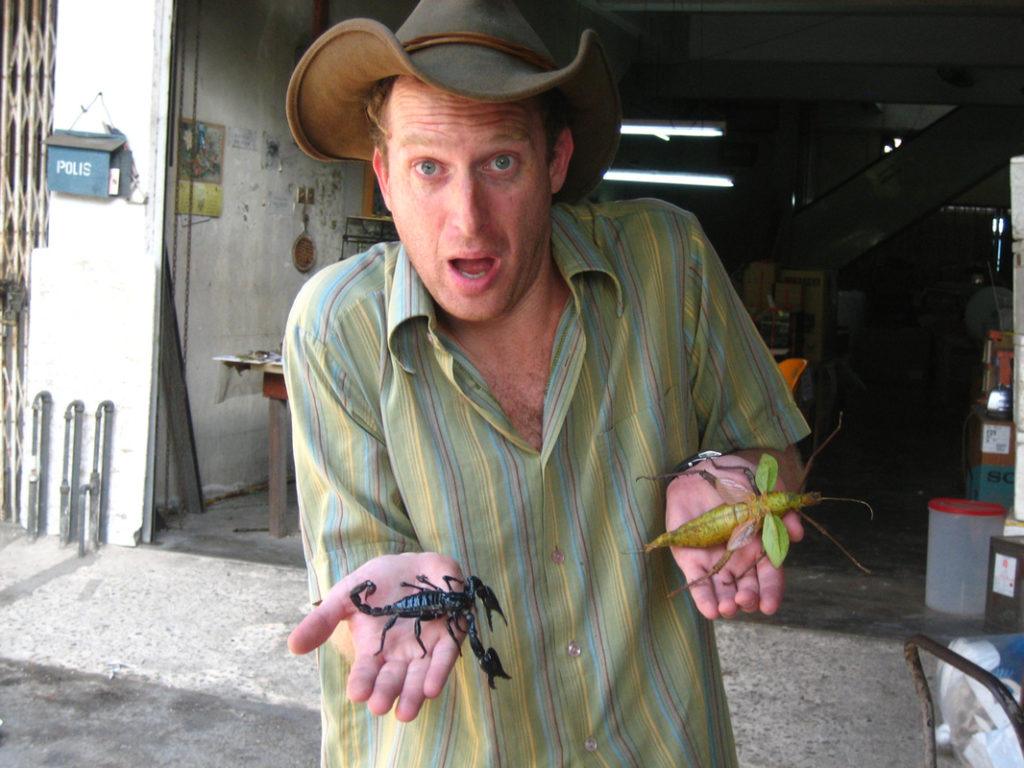
Oli: How long were you traveling around for the Global Bucket List? Were that memoirs from everything that you’ve done or new experiences?
Robbin: It was a bit of both. There were some gaping holes in my bucket list for the global book. In one year, it was a good year, I did the Galapagos, the Amazon, Antarctica and The High Arctic in one year.
That was for the global book to tick off. I was like, I can’t not have the Galapagos in the great global bucket list. So it’s a combination of 10 years of travel, as well as all these new experiences.
Australian Bucket List
By the time I got to Australia I kind of honed it into a bit of an art of not only distinguishing the experience and identifying it, being able to communicate it, and experience it, and I was able to do Australia. Not everything I wanted to do. But most of the things I wanted to do in just six months.
Oli: It’s a massive place, you must have been on the move quite a lot.
Robin: Yeah, we drove 20,000 kilometers and we took a dozen flights. I had my wife and two young kids with me, which led to another book: 75 places to take the kids before they don’t want to go. That was a whole different adventure and journey. We still have a bit of post-traumatic stress disorder from trying to do as much as we could do with children. It was nuts.
Traveling with kids
Oli: Last year, we did four months around Europe with our two year old going to 25 festivals in four months. Now looking back with what’s happened this year it was the best thing we did. How long did you travel with your kids?
Robin: It was an 11-month trip. We did six months in Australia, then we lived for six weeks in Chiang Mai in Thailand, in Bali and Hoi An Vietnam. There was no point in coming back. My daughter hadn’t started school yet. So we just kept kind of going, but instead of moving around in Australia, we stayed in over 50 hotels. So we were just moving so much and of course with kids, it just doesn’t work that well. You might be ready to go pack the bag, unpack the bag, but kids they like stability. They like routine.
So once we got to Asia, we could just stay in one place. It was amazing, absolutely incredible. Again, like you were saying in light of what’s going on. It’s amazing to have been able to do that and look back on that and say, you know, we were able to travel as a family to live in different countries. I think it’s going to be very different moving forward, it’s going to be a lot more difficult, or there’s going to be a lot more barriers and a lot more friction.
So, you know, the idea of just being able to jump on a plane. We went to Singapore for four days, jump on a plane, let’s go!. I think those days are kind of done.
Over Tourism
Oli: How do you see everything changing? What are your thoughts on this new normal that everyone’s talking about?
Robin: The last year just before COVID I got fascinated with over tourism, and sustainable tourism. It really hit me in Bali. When we arrived in Bali there was just so much garbage in the ocean and the roads were choked with traffic, and it just really, really hit me with the exponential growth of tourism and travel with so much money in it and the toll it was taking not only on the environment but on culture how we travel. I thought that the meaningful connections were being lost in a desperate rush to get hold of that mighty tourist dollar. I’ve seen it before. There are some places that are obviously more pronounced that you feel like you are walking around as a very privileged tourist.
It’s very difficult to have a connection with the local culture. That connection you really have to work for it. And certainly, in the beginning of my career, I didn’t have to work for it that hard. But as things progressed, I found myself working for it more and more. So I wrote a story about over tourism and this is at the time a buzzword that was really picking up steam. Dubrovnik because of Game of Thrones is overrun by all these cruise ships.
I actually did a keynote in New Zealand about it. There was this wonderful picture of you in New Zealand in the mountains and someone turned the camera around and there was a lineup like 100 people waiting to take that one picture.
The future of Tourism
So along comes COVID and that conversation of over tourism is almost laughable. I think any tourism business now would say give me over tourism issues because it’s better than no tourism issues.
“So in a sense what we’re seeing I think is a reset for tourism”
In some senses, it’s going to be better, because I think we are going to come back more sustainable with a bit more responsibility towards the environment and culture. And yet at the same time, that looseness of just being able to get on a plane, being able to explore without feeling like you’re a threat both culturally and now physically with health, it’s going to take some time for that to recover.
I am optimistic in general. But I think that it’s going to take some time. When we get back to that point, it will always be a bit different. My analogy is, it’s like going to a restaurant and you get food poisoning. You know, it’s unfortunate and you know that could be great reviews on TripAdvisor, and you go to this restaurant and you get food poisoning. You’re not going to go back to that restaurant in a hurry if at all, even if it was just a one off really unfortunate event. Maybe you’re starting to go back sheepishly or maybe you know you ate a pasta that gave it to you? Or more likely pink chicken. The next time you go you see that pasta you’re not gonna order it. But eventually, you might try it and say that’s really good, let me take some more and it will take a while before you’re like, Okay, I can go to that restaurant. I can eat that dish again.
Oli: What are you looking at now? Are you focusing on any new projects?
Robin: Going back to 2005 I was at a festival called Sziget in Hungary. I don’t know if you came across that one. The island is called Sziget in Budapest, it’s a big Music Festival. I remember wandering around it was the middle of the night and it was really cool. Like all these festivals in Europe are so amazing. I entered this tent, like a tea tent and I started talking to this girl as one does. My name’s Robin, I’m traveling around the world and doing all this stuff. She asked what I have done. I told her well, hang gliding here, river rafting there and all this stuff.
‘She said to me, that’s all great. What have you learned?’
The question has always haunted me about what I’ve learned through all these travels. It was something that kind of drove the idea behind my TEDx talk, traveled to learn. What did I learn from all these experiences?
Travel Novel
It’s something that I wanted to capture in writing as well. So in 2019, I took a year off to write a novel. I believe in the power of story to kind of get a greater truth across. I thought, if I could tell what I’ve learned through a story that people want to read, that’s fun, that captures all these great travel stories, especially the ones that I couldn’t write for newspapers or previous books. Change the names, protect innocent parties, so I wrote a novel in which I finished basically earlier this year.
It’s travel at its core theme. I hope to get it published. Right now, I don’t know if the world is aligned with the idea of travel internationally or jet setting travel novel about a beautiful young woman chasing the ghosts of a dead father across six continents. I don’t know if the world is ready for that. I don’t know if it belongs in fiction or in historical fantasy. Certainly, it’s from a different time. But I’m very proud of it. I love the story and I hope it gets out there and onto the shelves one day.
Travel Advice
Oli: From what you’ve learned traveling if someone is either looking to do their first trip or go away for a long time backpacking what would be your piece of advice?
Robin: Pack less for one thing. You’re going to overpack.
Well, first of all, I think right now given the climate, stay safe. I was getting a lot of press releases, especially in the states, like Arizona and California, like ‘we’re open for business’. Mexico, we’re open for business! I thought that was very premature and somewhat irresponsible to open. I understand there’s a lot of businesses, there’s a lot of people, millions of people on the line, livelihood, including my own, with getting tourism back on the agenda. But at the same time, we weren’t ready for it. It really was irresponsible to start promoting tourism before we were ready for it.
So the first thing is wait for it to be safe for it to be really safe. Then you’ll probably find not only great deals but a really enthusiastic response to going out there. People will be so grateful to see you as a tourist, and this is our chance to travel again with more responsibility. To go into each adventure with an open heart and an open mind and drop the entitlement. That’s a huge thing.
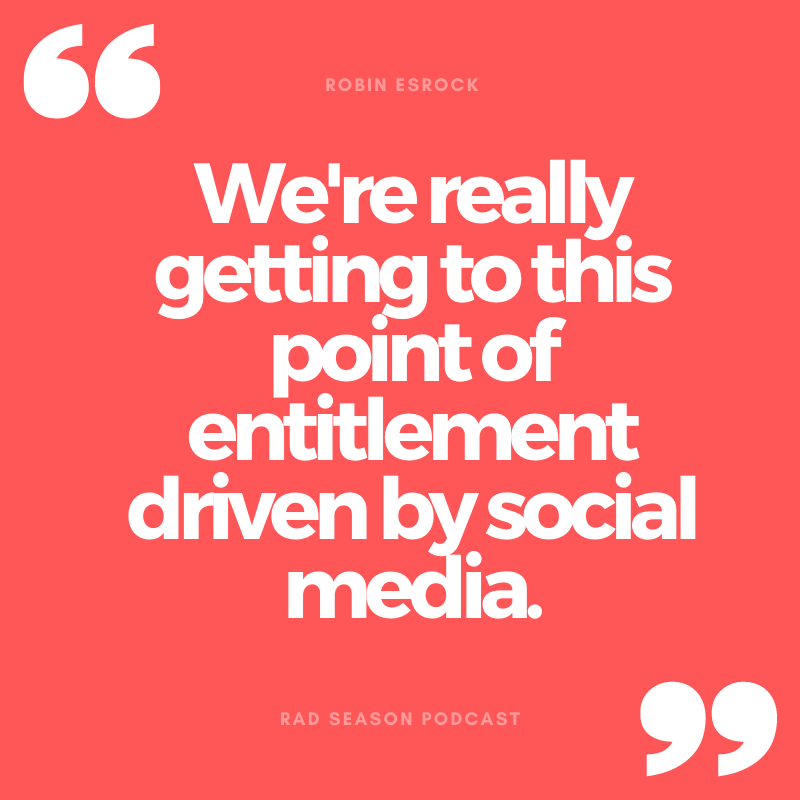
Look at this amazing thing where I am, you’re entitled to have that experience too. You’re not, you know, there’s a lot of setup and there’s a lot of fakery and tomfoolery going on behind the scenes to get that image. Your experience will be your own. If you go in there with a higher level of entitlement with a lot of expectations. I’m going to Spain and I want to run with the bulls. So you’re probably going to be disappointed when you run with the bulls because it’s not going to be what you think it’s going to be.
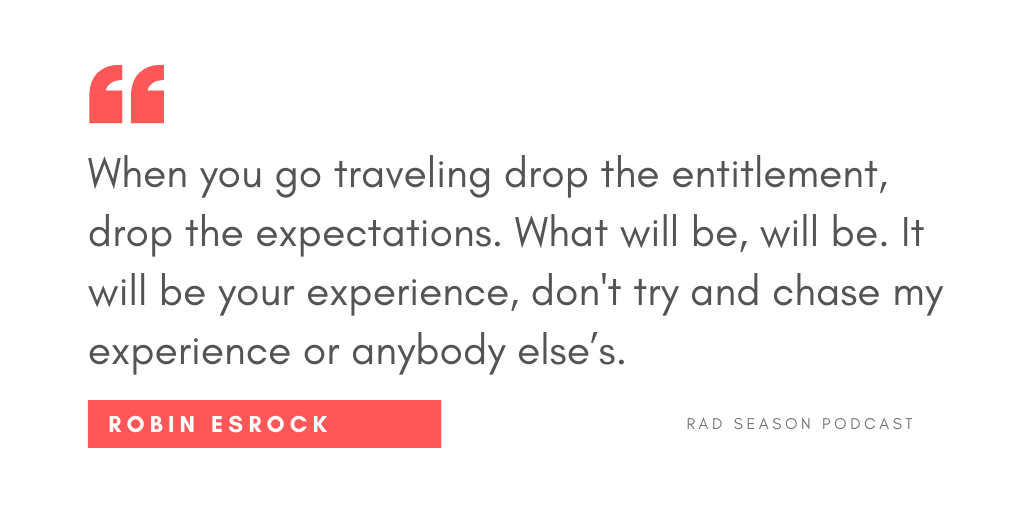
You watch something on TV and I want to do that. It’s like when you do it, it’s gonna be totally different, the people will be different. The weather will be different, the food will be different, you know, that’s great. That’s awesome, it’s yours you can own it.
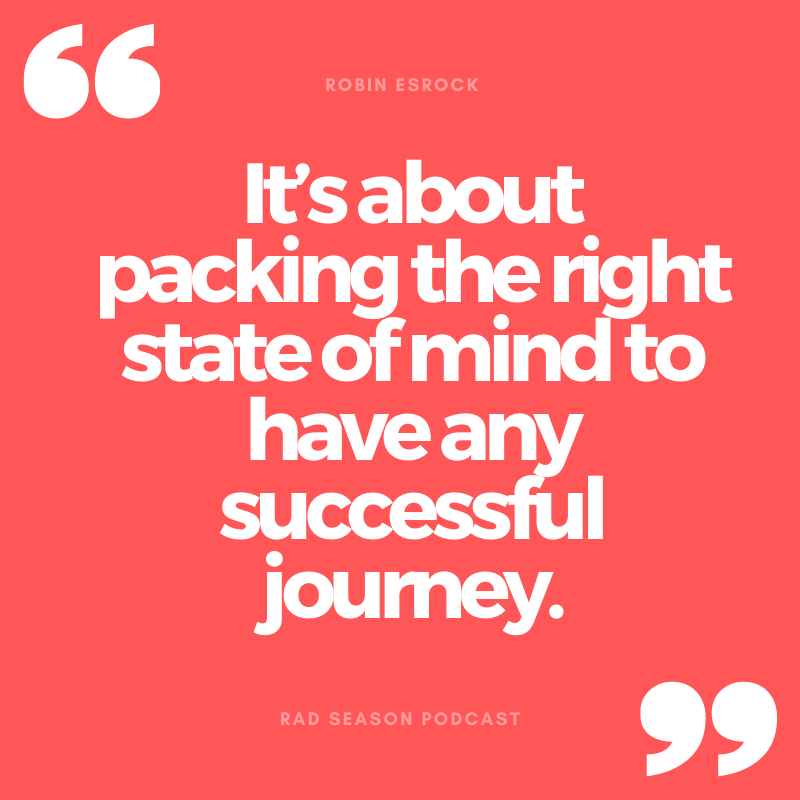
Oli: What’s the best way to contact you and find out what you’re up to and when the new book comes out?
Robin: I’ll be putting everything out on my blog Robinesrock.com. Right now I run 4 blogs I think, I’ve lost count. But robinesrock.com is where I live online. There’s been lately quite a few posts about COVID. You know just looking at everything and trying to make sense of it. But at the end of the day, I was given a very fortunate gift to be able to go to the places and see the things that most people don’t get to see.
In this new world that we live in, it’s a more beautiful gift than I could ever have imagined. You know, I think one day there’s gonna be a solar flare and satellites are going to go down, and after, you know, we’re going to go back to the stone age. Then they’ll be like, tell us about that time you visited Kenya, you know because it’s gonna be so far fetched.
The world has become so close, so accessible. I really hope that we can keep that accessibility and that travel doesn’t become this thing for the rich for the extraordinarily rich that airlines can recover and yet be more sustainable when they do.
I’m going to be watching with great interest how this is all going to unfold. And in the meantime, get this book published because I think people will love it, and then write another one.
Oli: Thanks Robin, it’s been great chatting. Good luck with the book.
Robin: Right on Oli, thanks a lot.
Watch the video:
Photo Credit: Robin Esrock
Missed the last episodes? Check them out!
Episode 9: Wife Carrying – Julia Galvin
Episode 10: Big Wave Surfing – Andrew Cotton
Episode 11: Dark Tourism – Tommy Walker
Last updated on Jul 18, 2020Have you subscribed to our Newsletter or Podcast? Listen to us on Apple Podcast and Spotify and follow us on Facebook, Instagram Twitter and YouTube.
Accommodation near Vancouver, Canada
Rad Season is providing you with rentals and hotels at the lowest prices available online. Book your stay near Vancouver, Canada using the map below!
